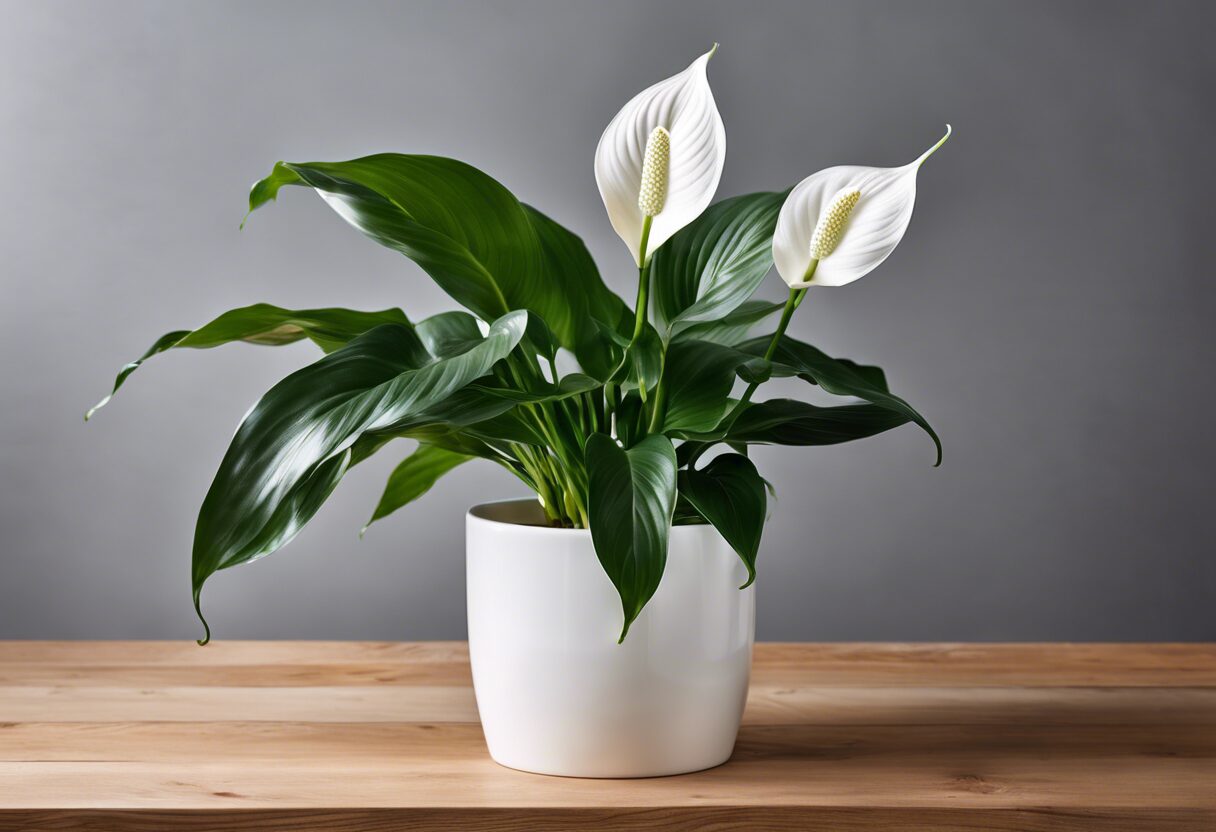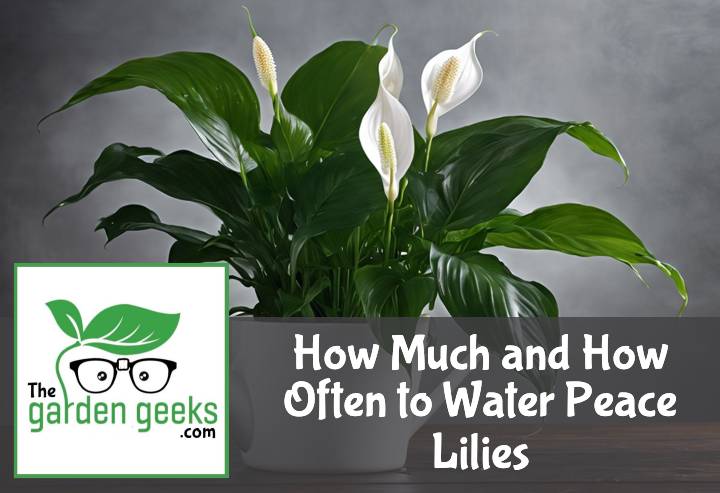Ever found yourself staring at your peace lily, watering can in hand, wondering just how much H2O this green beauty needs? Trust me, you’re not alone. It’s a common houseplant conundrum! The good news is, I’ve got the perfect guide on How to Water Peace Lilies right here.
In the world of indoor plants, peace lilies hold a special place. They’re easy-going, forgiving if you forget a watering session or two and they reward your care with stunning flowers. But getting the watering bit right can be tricky. Keep reading about How Much and How Often to Water Peace Lilies.
Key Takeaways
- Peace Lilies should be watered once a week, but this can vary depending on the environment.
- The plant prefers moist soil, not soggy. Overwatering can lead to root rot.
- Yellow leaves are often a sign of overwatering, while brown tips indicate under-watering.
- It’s best to use room temperature water and avoid tap water if it’s high in chlorine.
- Watering should be reduced during winter as the plant enters dormancy.

Understanding Peace Lilies
Peace lilies, or as the botanists like to call them, Spathiphyllum, are a popular choice among indoor plants. They’re not just pretty faces; they’ve got a lot going on beneath those glossy leaves.
What are Peace Lilies?
Peace lilies belong to the Spathiphyllum species, originating from tropical regions. These aren’t your typical daisies or roses; they’re tropical plants with an exotic flair. Their dark green foliage and white flowers give them a unique charm that’s hard to resist.
They’re more than just an indoor foliage plant though. These beauties have some impressive air-purifying abilities too! Talk about beauty and brains, eh? The peace lily’s features make it a hit in homes and offices alike.
Why do Peace Lilies need water?
Now let’s get down to business: watering peace lily plants. Like all living things, peace lilies need water to survive. But it’s not just about survival; it’s about thriving!
Water is crucial for the plant’s hydration needs. It helps transport nutrients from the soil to different parts of the plant. Without enough water, your peace lily might start looking more like a wilted salad than a vibrant houseplant.
But don’t go turning your home into a rainforest just yet! While moisture is essential for plant growth, too much can be harmful. Finding that sweet spot in terms of peace lily watering requirements is key for keeping this indoor gem happy and healthy.
Remember folks, when it comes to figuring out how to water peace lilies, it’s all about balance!
How Much to Water Peace Lilies


When it comes to how to water Peace Lilies, there’s no one-size-fits-all answer. It’s a bit like making grandma’s secret soup recipe – you’ve got to feel it out. The Peace Lily watering requirements can vary, and it’s all about finding that sweet spot.
Factors influencing the amount of water needed
First off, let’s talk light exposure. If your peace lily is sunbathing by the window, it’ll need more H2O than its shady cousin in the corner. That’s because sunlight speeds up evaporation, making your plant thirstier.
Temperature also plays a role in this watering waltz. In warmer conditions, your peace lily might be guzzling water like a marathon runner on a hot day. On the flip side, if it’s cooler, they won’t need as much.
Lastly, don’t forget about pot size! A big pot holds more soil which retains more moisture, so you might not need to water as often. So remember folks, when adjusting your watering for conditions, always consider these environmental factors in plant care.
Signs of overwatering and underwatering
Now let’s get down to some plant detective work. If your peace lily starts looking like a wilted salad, chances are you’re overdoing the watering. Other signs of an overwatered peace lily include yellow leaves and root rot.
On the other hand, if your plant looks like it could use some TLC and has brown leaf tips or wilting leaves despite wet soil – that’s a classic sign of underwatering.
In both cases, adjusting your watering practices is key for maintaining healthy Peace Lilies. So keep an eye out for these Peace Lily leaf changes and remember – when in doubt, less is more!



How Often to Water Peace Lilies
Watering frequency is a biggie when it comes to peace lily care. Whether you’re an indoor plant parent or an outdoor green thumb, knowing how often to water your peace lilies can be the difference between a thriving plant and a wilting one. Factors like location, temperature, and light exposure can all influence your peace lily water frequency.
Here is a table detailing guidelines for watering Peace Lilies under various conditions:
| Condition | Watering Frequency | Details |
|---|---|---|
| Standard Indoor | Every 1 to 2 weeks | Water when the top inch of soil feels dry. Adjust based on humidity, temperature, and light conditions. |
| High Humidity | Every 2 to 3 weeks | In humid environments, Peace Lilies require less frequent watering. |
| Low Humidity/Air | Every 5 to 7 days | Dry air conditions may require more frequent watering to maintain moist soil. |
| Bright, Indirect Light | Every 1 to 2 weeks | Brighter conditions can lead to faster soil drying, requiring slightly more frequent watering. |
| Low Light | Every 2 to 3 weeks | In lower light, the soil stays wet longer, so water less frequently to avoid overwatering. |
| Warm Temperatures | Every 1 to 2 weeks | Higher temperatures can lead to faster evaporation, requiring more frequent watering. |
| Cool Temperatures | Every 2 to 3 weeks | In cooler conditions, the soil stays moist longer, reducing the need for frequent watering. |
| After Repotting | Monitor soil moisture | Water thoroughly after repotting, then wait until the top inch of soil is dry before watering again. |
| Dormant Period (Winter) | Every 3 to 4 weeks | During winter, when growth slows, Peace Lilies need less water. Monitor the soil and water less frequently. |
Remember, these are guidelines, and the actual watering frequency may vary based on your home’s specific conditions. Always check the soil moisture before watering and adjust as necessary to prevent overwatering or underwatering.
Best Practices for Watering Peace Lilies
Alright, let’s dive into the nitty-gritty of how to water peace lilies. Proper watering is a biggie in peace lily care, folks! It’s not just about drenching the soil; it’s also about when and what you use to quench your plant’s thirst.
Time of Day to Water Peace Lilies
Now, you might be wondering, “What time should I water my peace lily?” Well, there are some pretty cool reasons why certain times are better than others.
Morning watering has its perks. The sun isn’t too harsh yet, so your plant can absorb the moisture without getting scorched. Plus, it sets up your peace lily for a day of photosynthesis fun!
But what about evening watering? Some folks swear by it because it mimics nature’s dewy dusk routine. However, be careful not to overdo it at night as this could lead to root rot.
So basically, whether you’re an early bird or a night owl, there’s a peace lily watering schedule that works for you and your leafy friend.
Type of Water Suitable for Peace Lilies
Moving on to another important aspect – the type of water used. Not all H2O is created equal when it comes to watering peace lilies.
Tap water might seem like an easy option but beware! It often contains chlorine and other chemicals that aren’t exactly plant-friendly. Over time these nasties can build up in the soil and harm your peace lily.
Distilled or filtered water is usually a safer bet for maintaining healthy peace lilies. They’re free from those harmful chemicals found in tap water and provide ideal hydration conditions for plants.
So remember folks, when it comes to indoor plant watering practices, timing and type of water matter! Keep these tips in mind and your peace lily will thank you.
Troubleshooting Common Watering Issues
When it comes to how to water peace lilies, there’s a lot that can go wrong. From yellow leaves to brown leaf tips, these plants can be quite finicky. But don’t worry, we’re here to help you troubleshoot these common peace lily watering issues.
Yellow leaves: Overwatering or Underwatering?
Ever noticed your peace lily sporting some yellow leaves? Well, this could be due to either overwatering or underwatering. Yes, you heard it right! Both extremes can lead to yellow leaves on peace lilies.
Now, how do you differentiate between the two? It’s all in the details. If your plant has yellow leaves and a soggy base, chances are you’ve been a bit too generous with the watering can. That’s an overwatered peace lily symptom for ya!
On the other hand, if the yellow leaves are accompanied by wilting despite the soil being dry, then my friend, you’ve got yourself an underwatered peace lily sign.
Brown leaf tips: Lack of humidity or too much sun?
Moving on to another common issue – brown leaf tips. These are usually caused by lack of humidity or excessive sunlight exposure. Peace lilies love their humidity and aren’t big fans of direct sunlight.
If your plant is showing brown leaf tips on peace lilies, check its surroundings first. Is it sitting in a dry room? Or maybe it’s getting too much sun? Remember, these plants have specific humidity requirements for peace lilies and sunlight needs for peace lilies.
To fix this issue, try moving your plant to a more humid environment or away from direct sunlight. Trust me; your peace lily will thank you for it!


To Wrap Up
Just like your favorite goldfish, peace lilies need the right amount of TLC. Not too much, not too little. It’s a Goldilocks situation! Remember, it’s all about balance when figuring out how often and how much to water these lovely plants.
So, don’t let your peace lilies turn into parched prunes or drowned ducks. For more tips on How to Water Peace Lilies, follow the link. Happy watering!


